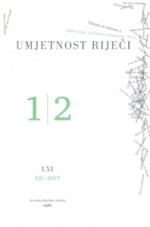Zavodljivi jezici – Krležina Saloma i vajldovski esteticizam
SEDUCTIVE LANGUAGES OF KRLEŽA’S SALOME AND WILDEAN AESTHETICISM
Author(s): Igor MedićSubject(s): Comparative Study of Literature, Croatian Literature
Published by: Hrvatsko filološko društvo
Keywords: Miroslav Krleža; Salome/Saloma; Oscar Wilde; aestheticism; autoreferentiality;
Summary/Abstract: The paper avoids interpreting Krleža’s play Salome (Saloma) through the usual lens of Krleža’s memoirs Bygone Days (Davni dani), or the author’s numerous claims about the meaning of the text. Instead, in the author’s ever-changing formulation of the final meaning of the text, the interpretation recognizes the same procedures that are used by Salome for seducing and manipulating men surrounding her in the play. Salome is a supreme orator in the play, always conscious of her use of language, of the repercussions of her speech and of the textuality of the world she inhabits. The paper suggests that a method for analysing the language of the play can be found in the discursive mechanisms of Oscar Wilde’s renowned play Salomé, as a prime example of the decadent use of language, although Wilde’s influence on Krleža’s play has mostly been disputed. The paper argues that the influence of Wilde’s aestheticism is not visible in the adoption of typical motifs, characters or plot, but in the autonomous and self-reflective language play in Krleža’s text.
Journal: Umjetnost riječi
- Issue Year: 2017
- Issue No: 1-2
- Page Range: 87-111
- Page Count: 25
- Language: Croatian

